Passenger List of the SS Minnetonka – First Class, 18 June 1904, London to New York
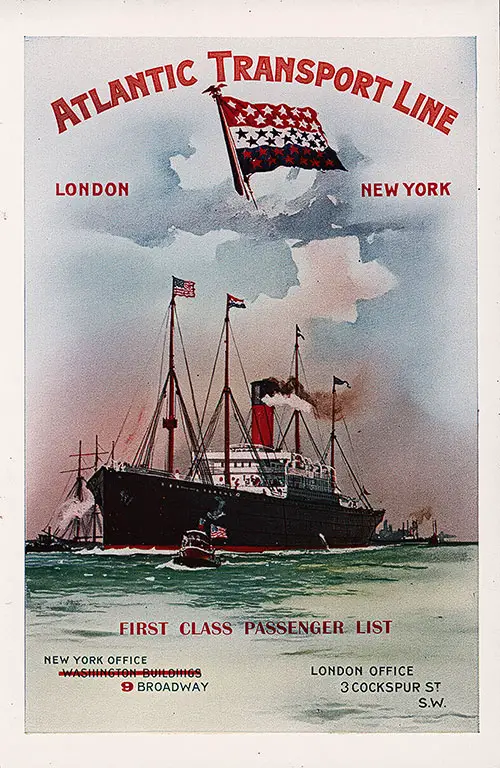
Front Cover, SS Minnetonka First Class Passenger List, Departing 18 June 1904 from London to New York, Commanded by Captain Sydney Layland. | GGA Image ID # 15bb43c387
🚢 Review and Summary: SS Minnetonka Passenger List – 18 June 1904
Introduction
The SS Minnetonka, a luxurious liner of the Atlantic Transport Line, departed London on 18 June 1904 bound for New York City. Commanded by Captain Sydney Layland, the vessel carried a distinguished roster of first-class passengers across the Atlantic at a time when international travel was both a statement of wealth and a means of forging transatlantic connections.
This passenger list is not simply a roll of names—it is a fascinating snapshot of early 20th-century society, highlighting academics, professionals, wealthy families, and transatlantic travelers who were central to the cultural and economic exchanges between Europe and America.
🛳️ The Ship: SS Minnetonka
- Launched: 1902 (sister ship to the Minnehaha, Minneapolis, and Minnewaska)
- Operator: Atlantic Transport Line (part of International Mercantile Marine Co.)
- Route: London → New York
- Notable Features: Built for the transatlantic luxury trade, the Minnetonka carried mostly first-class passengers and cargo, with a reputation for comfort and elegance.
- Voyage Date: 18 June 1904
Explore the SS Minnetonka’s 18 June 1904 First Class Passenger List from London to New York. Discover notable figures including Columbia University’s Prof. James C. Egbert, publishing family George P. Putnam, and rising composer Paul Tietjens. A valuable resource for genealogists, historians, and educators.
Senior Officers and Staff
- Commander: Captain Sydney Layland
- Surgeon: J. L. Fox
- Chief Engineer : Robert Bell
- Purser: H. Forney Baker
- Chief Steward : R. L. Evans
📜 Senior Officers and Crew Highlights
Commander: Captain Sydney Layland – an experienced R.N.R. captain entrusted with IMM’s premier liner.
Surgeon: Dr. J. L. Fox – responsible for passenger health at a time when transatlantic voyages carried risks of influenza and seasickness.
Purser: H. Forney Baker – managed finances, letters, and valuables, crucial for international travelers.
First Class Passengers
List of Passengers, Part 1 (Edward Adams-Mr. G. C. Gennert)
- Mr. Edward Adams
- Miss Ella Allen
- Mr. M. N. Baker
- Mrs. M. N. Baker
- Miss T. H. Baker
- Miss Elizabeth Baker
- Miss Ruth Baker
- Master Frederick Baker
- Miss E. M. Berry
- Miss M. Berry
- Mr. Chas. L. Bowman
- Mr. C. A. Bramley
- Miss J. T. Brooks
- Mr. C. J. Brothers
- Mr. Frank Cash
- Mr. William Cheek
- Mr. Henry G. Colby
- Mr. G. E. Crater
- Mr. S. J. Drake, Jr.
- Mr. Alphonse le Duc
- Mrs. Alphonse le Duc
- Miss Alma de L. le Duc
- Miss Yvonne de M. le Duc
- Mr. T. C. Dunham, Jr.
- Mrs. Walter D. Eaton
- Prof. Jas. C. Egbert, Jr.
- Mrs. Egoert, Jr.
- Mr. Henry D. Egbert
- Mr. George B. Egbert
- Mr. Lester D. Egbert
- Miss Virginia Elbert
- Miss S. Finney
- Mr. W. S. Flemming
- Mr. G. C. Gennert
List of Passengers, Part 2 (Mrs. G. C. Gennert- P. A. Young)
- Mrs. G. C. Gennert
- Mr. F. A. Gordyn
- Mr. Gustavus Green
- Mrs. F. Greiner
- Dr. L. T. Griffiths
- Mr. Paul A. Harsch
- Mrs. Paul A. Harsch
- Mrs. C. Hazleton
- Mr. Saxon W. Holt
- Mrs. Saxon W. Holt
- Mr. A. A. Howlett
- Mrs. A. A. Howlett
- Mr. W. B. Hughes
- Mr. C. P. hunt
- Mr. Chas. E. Hutchinson
- Miss Delia Lee
- Miss Josephine Lee
- Miss Nancy Lee
- Mr. Paul MacCormac
- Mrs. Paul MacCormac
- Mr. J. H. McCreery
- Mr. Arthur McCreery
- Mr. Sidney F. McCreery
- Mr. Andrew M. McDermott
- Mrs. McDermott
- Master Kenneth McDermott
- Mrs. R. T. McDonald
- Miss Esther McDonald
- Mr. E. J. Milliken
- Mr. Jehu C. Moore
- Mrs. S. M. Nave
- Mr. E. J. Norris
- Mr. James Ormiston
- Mrs. James Ormiston
- Miss Mary Ormiston
- Miss Amy E. Pattee
- Mr. George P. Putnam
- Mrs. George P. Putnam
- Mr. Ira D. Remsen
- Mrs. Remsen
- Mr. H. B. Sanderson
- Mr. E. C. Shaw
- Mrs. E. C. Shaw
- Mrs. Elizabeth Sivell and Maid
- Miss Daisy M. Sivell
- Master Henry L. Sivell
- Master Charles B. Sivell
- Mr. Sidney Smith
- Miss H. B. Terbell
- Mr. Paul Tietjens
- Mrs. Paul Tietjens
- Mr. E. C. Toller
- Dr. Charles M. Wharton
- Mrs. Charles M. Wharton
- Miss Katherine D. Whitman
- Mr. P. A. Young
👥 Notable Passengers and Social Context
Academic Presence
Prof. James C. Egbert, Jr. (1859–1948) (Columbia University) – His inclusion reflects the growing transatlantic academic exchange, as professors often lectured or conducted research in Europe. His wife and extended family accompanied him, underscoring the blending of professional and personal travel during this era. James Chidester Egbert Jr., Ph. D. was an American classical scholar and educator. His wife was Emma Gross Pennington who traveled with him.
Publishing and Exploration
Mr. George P. Putnam (1887-1950) and Mrs. Francis Faulkner Putnam (his mother) – Members of the illustrious publishing family (George Palmer Putnam’s Sons). This is particularly notable since the firm shaped American literary culture. The Putnam family became deeply tied to aviation and exploration because of Geroge Putnam's marriage to Amelia Earhart.
Medical and Professional Figures
Dr. L. T. Griffiths – Medical professionals were frequent travelers, often attending conferences or expanding their practices.
Dr. Charles M. Wharton (1871-1949) – His presence further reflects the ship’s connection to professional elites. Dr. Charles M. Wharton, who died Monday 14 November 1949 at the age of 78. was one of the state's great athletes and one of its best known citizens. Old timers will remember him as All-American guard on the University of Pennsylvania football teams of more than half a century ago. A keen interest in athletics and the training of young men colored much of his life after his college years. He was active in Penn’s athletic program for nearly four decades; after he left there in 1931 he headed the University of Delaware's newly created Department of Athletics for six years. During the First World War he put his skill and experience at the service of his country by organizing and directing physical training activities for the Navy and Air Force with Walter Camp. But if this was the ruling interest of Buck Wharton's life, it was far from the only one. He served as state senator from 1914 to 1918 and was the Democratic nominee for governor in 1928. Later he became executive director of the Delaware Unemployment Compensation Commission. He will be as widely mourned as he was widely known, especially by the men—many now grey themselves—who knew his wise guidance on the playing fields at Delaware and at Penn. (The News Journal, Wilmington, DE, 1949-11-16, p. 8)
Distinguished Families
The M. N. Baker family (Mr. and Mrs. M. N. Baker with children Elizabeth, Ruth, and Frederick) illustrate the growing popularity of family transatlantic vacations in the Edwardian era.
The Alphonse Émile Leduc family (Alphonse, Mrs. Le Duc, Alma, and Yvonne) highlight Franco-American ties in an era when cultural exchange was a hallmark of high society. The Éditions Alphonse Leduc company is a prominent French music publishing house specializing in classical music. It was created in Paris in 1841. Since January 2014, Leduc is part of the Wise Music Group (formerly the Music Sales Group).
Rising Creative Figures
Mr. Paul Tietjens and Mrs. Eunice Strong Hammond Tietjens – Tietjens would go on to become a composer tied to early modernist music circles in America. His inclusion here foreshadows cultural developments that would later transform the arts.
General Information for Passengers
- TEA and COFFEE: at 7 a.m.
- BREAKFAST: 8.30 a.m.
- LUNCH: 1 p.m.
- DINNER: 7 p.m.
Meals for Nurses and Children :—
- BREAKFAST, 8 a.m.;
- DINNER, 12 noon;
- TEA, 5 p.m.
Please apply to Second Steward for seating accommodation at Table.
LIGHTS in the Saloon are extinguished at 11 p.m., and in the Smoking Room at 11.30 p m.
BAR closes at 11 p.m.
SMOKING is not allowed in the Saloon, State-rooms or Companion-ways.
THE SALOON STEWARD will supply Stamps, Telegraph Forms, Books of Reference, and Railway Time Tables of the Principal Companies.
DIVINE SERVICE.—Intimation regarding Divine Service will appear on the Notice Boards every Sunday morning.
VALUABLES.—Passengers are enjoined to be very careful in the disposal of small articles of baggage, more especially during Embarkation, when there are always strangers on Board.
Money, Jewellery, and valuables of any kind, should always be left securely under lock and key.
Passengers may deposit with the Purser any Money, Jewellery, etc., for safe keeping during the voyage, but no responsibility can be accepted for same.
For the convenience of Passengers the Purser is prepared to exchange a limited amount of English and American money. The rate of exchange will be $4.80 to the £1 when giving American in exchange for English currency, and £1 to $4.90 when giving English money for American.
LUGGAGE.—Only hand-bags and trunks which will fit underneath the berths are allowed in the State-rooms ; all large or heavy luggage must be placed in the Baggage Room, to which access can be gained by applying to the Officer in charge of Baggage. Passengers will greatly expedite the disembarkation if they will have their State-room Baggage packed ready for removal directly on arrival, so that the transfer may at once be proceeded with.
ELECTRIC BELL CALLS.—For Steward, one ring ; for Stewardess, two rings.
PASSENGERS’ ADDRESSES should be left with the Purser, in order that any letters sent to the care of the Company may be forwarded.
LETTERS.—Passengers may have their letters addressed to any of the Company’s Offices given below, where they will be retained until called for, or forwarded according to instructions.
🖼️ Noteworthy Images from the Passenger List
Front Cover, SS Minnetonka First Class Passenger List, 18 June 1904 – An elegant design underscoring ATL’s prestige.
ATL Sailing Schedule (1904) – Featuring Minnetonka alongside sister ships Manitou, Mesaba, Minnehaha, and Minneapolis.
Back Cover Track Chart (Unused) – A beautiful artifact showing the North Atlantic route, complete with a memorandum of log.
Fire Danger Insert (1904) – A fascinating safety reminder about not discarding matches on deck, revealing early maritime fire prevention concerns.
🎓 Relevance for Teachers, Students, Genealogists, and Historians
Teachers & Students: This list is an excellent classroom tool to explore Edwardian society, transatlantic travel, and the role of passenger liners in global culture. It ties into history, literature, and social studies.
Genealogists: A treasure trove for tracing elite American and European families traveling between continents.
Historians: Provides insights into professional networks, cultural exchange, and the importance of publishing, academia, and medicine in shaping transatlantic identity.
💡 Final Thoughts – Why This Passenger List Matters
The SS Minnetonka’s voyage of 18 June 1904 offers much more than a record of travelers—it provides a window into Edwardian-era transatlantic society. With professors, publishers, doctors, families, and early cultural figures aboard, this passenger list demonstrates how ocean liners served as bridges of knowledge, culture, and prestige.
By preserving and analyzing lists like this, we not only trace genealogical connections but also deepen our understanding of how the Atlantic world was knit together through travel and exchange.
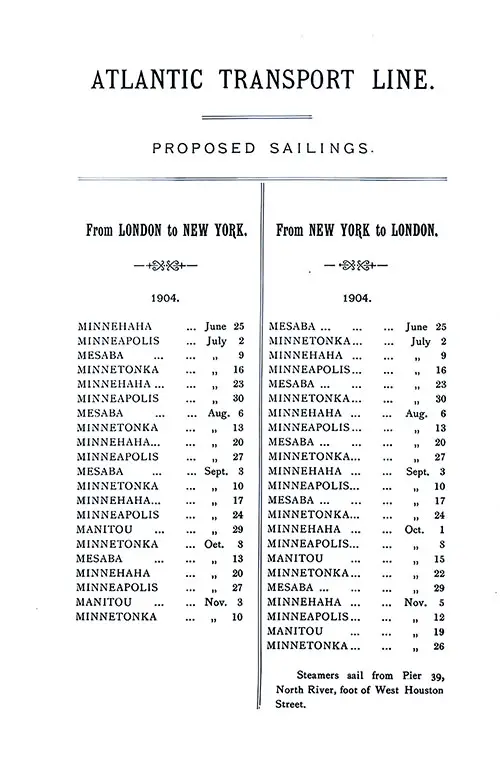
ATL Sailing Schedule, London-New York Service, from 25 June 1904 to 26 November 1904. Ships Included the Manitou, Mesaba, Minnehaha, Minneapolis, and Minnetonka. Steamers Leave from Pier 39, North River, Foot of West Houston Street. SS Minnetonka First Class Passenger List, 18 June 1904. | GGA Image ID # 22e6b03e95
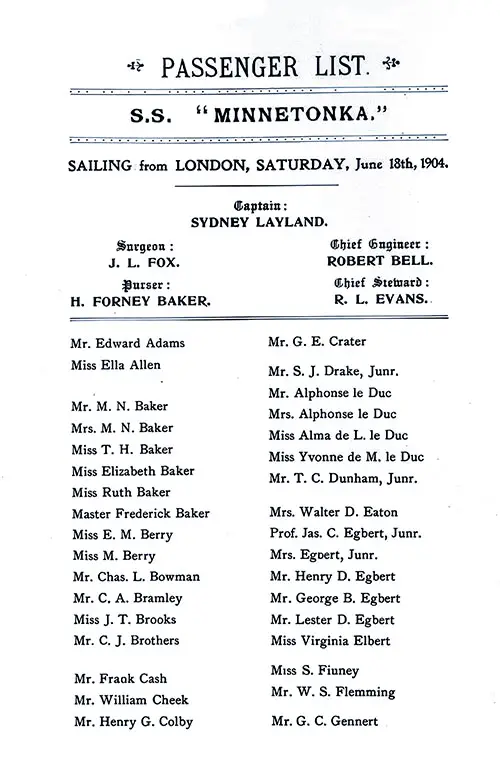
Title Page, Listing of Senior Officers, List of Passengers, Part 1 (Edward Adams-Mr. G. C. Gennert). SS Minnetonka First Class Passenger List, 18 June 1904. | GGA Image ID # 22e6ca5306
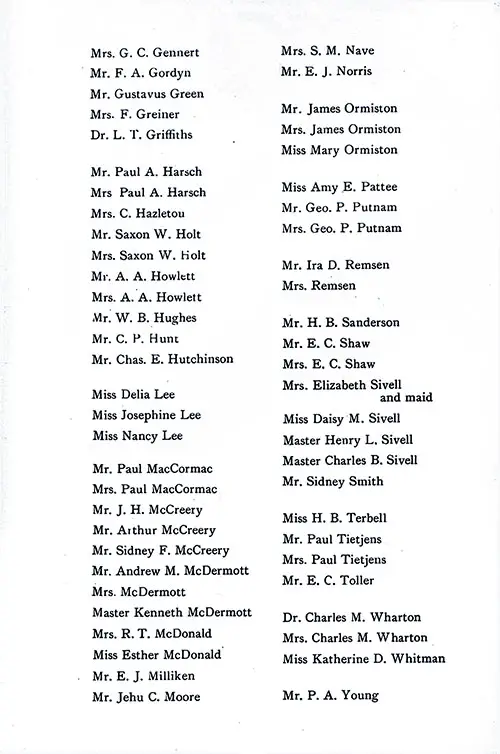
List of Passengers, Part 2 (Mrs. G. C. Gennert- P. A. Young). SS Minnetonka First Class Passenger List, 18 June 1904. | GGA Image ID # 22e6d21308
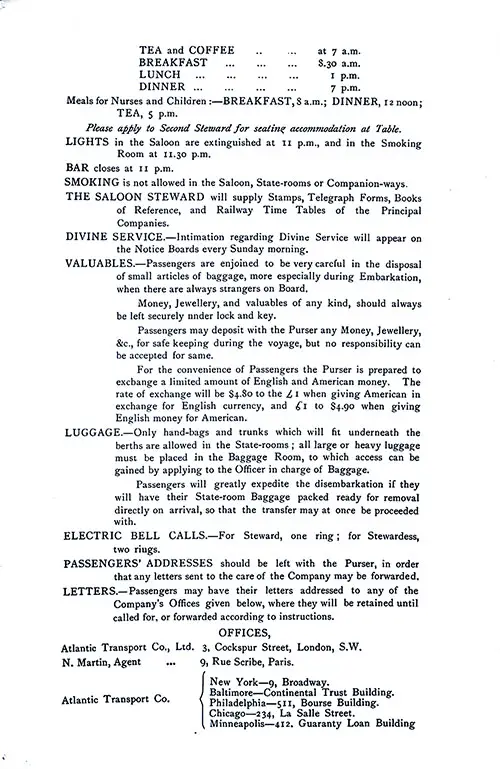
Information for Passengers and Atlantic Transport Company Offices. SS Minnetonka First Class Passenger List, 18 June 1904. | GGA Image ID # 22e70e7a47
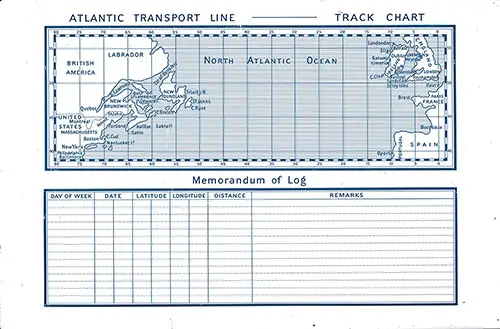
Back Cover: Atlantic Transport Line Track Chart of the North Atlantic Ocean with Memorandum of Log (Unused). SS Minnetonka First Class Passenger List, 18 June 1904. | GGA Image ID # 15bb77e105
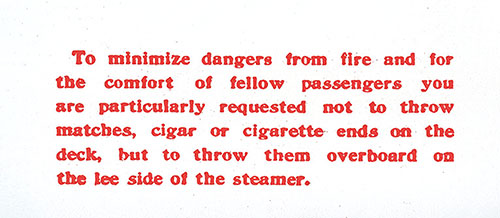
Fire Danger Insert: To minimize dangers from fire and for the comfort of fellow passengers, you are particularly requested not to throw matches, cigar, or cigarette ends on the deck, but to throw them overboard on the lee side of the steamer. SS Minnetonka First Class Passenger List, 18 June 1904. | GGA Image ID # 173551f330
📜 Research note: Some names and captions were typed from originals and may reflect period spellings or minor typographical variations. When searching, try alternate spellings and cross-check with related records. ⚓
Curator’s Note
For over 25 years, I've been dedicated to a unique mission: tracking down, curating, preserving, scanning, and transcribing historical materials. These materials, carefully researched, organized, and enriched with context, live on here at the GG Archives. Each passenger list isn't just posted — it's a testament to our commitment to helping you see the people and stories behind the names.
It hasn't always been easy. In the early years, I wasn't sure the site would survive, and I often paid the hosting bills out of my own pocket. But I never built this site for the money — I built it because I love history and believe it's worth preserving. It's a labor of love that I've dedicated myself to, and I'm committed to keeping it going.
If you've found something here that helped your research, sparked a family story, or just made you smile, I'd love to hear about it. Your experiences and stories are the real reward for me. And if you'd like to help keep this labor of love going, there's a "Contribute to the Website" link tucked away on our About page.
📜 History is worth keeping. Thanks for visiting and keeping it alive with me.
